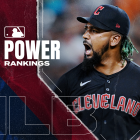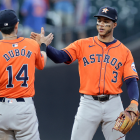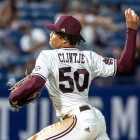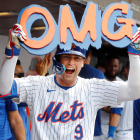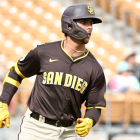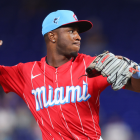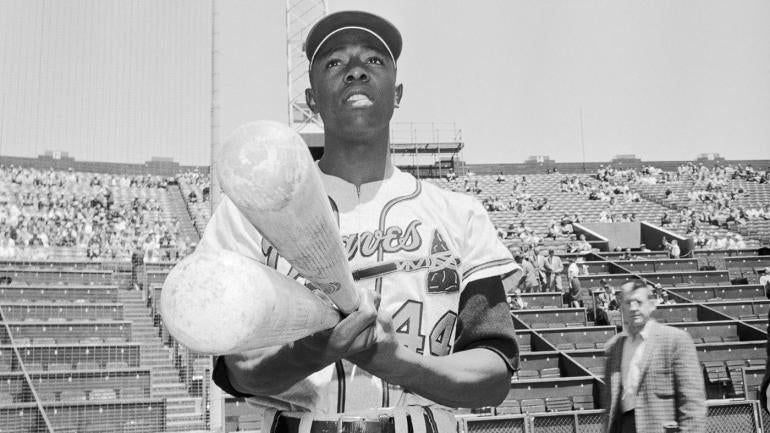
Above, you'll see the late, inexpressibly great Hank Aaron in 1960, wearing a Braves jersey that's nigh identical to what the team wears now and has worn for many years.
Now imagine all other elements the same -- the colors, the piping, the billowy Braves script (or billowy "Atlanta" for road games), the number placement -- except replace the tomahawk with a hammer. It would go a little something like this:
The #Hammers shirts are in! pic.twitter.com/euCnyp6P9Y
— Ryan Cothran (@baldheaded1der) November 6, 2020
That tomahawk design first appeared, festooned on satin, on May 11, 1946, when the Braves still toiled in Boston. It disappeared from their jerseys in 1963, when they were in Milwaukee, only to come back in 1987, just in time for the Braves' near-dynastic run in the 1990s. It's been there ever since. How simple it would be to turn that tomahawk into a hammer -- or, to be more precise, the Hammer.
If the Atlanta Braves decide that it's time for a name change following what's happened to the Washington Football Team and the Cleveland baseball team, then they should swiftly pivot to the Atlanta Hammers in lasting homage to the most luminous player in franchise history and one of the innermost greats in the sprawling history of baseball itself.
The Hammer was, of course, Aaron's most prominent nickname. The reasons are obvious. The word shares a first consonant with Aaron's first name, and the implications of weaponized might are fitting for a player who, yes, hammered 755 home runs, 624 doubles, and 98 triples across his 23-year MLB career, 21 of those years with the Braves. The man had 712 more total bases than anyone else in MLB history. Hammer indeed. (Aside: He was also called "Bad Henry" on occasion, and the brilliance of the name "Atlanta Bad Henrys" is duly noted. In this exercise, let us more realistically reach for the lower reaches of the sky and not the much loftier stars themselves.)
For a player so strongly associated with the franchise for which he played, Aaron is perhaps light on lasting tributes -- especially given the breadth of his accomplishments, his fundamental decency as a human being, and his immense personal courage. There's a ballpark in Mobile, Alabama, his hometown, named after him. You can find a smattering of streets and avenues named in his honor, and there's a state trail outside Milwaukee. With Aaron's passing at the age 86, it's time to erect something more universally conspicuous in tribute to the man. When you think of Atlanta baseball, you should think of Hank Aaron. The Atlanta Hammers would make unavoidable such a good thing.
This, of course, plays into the groundswell of team's moving away from using Native American words and imagery in their branding. The Washington Football Team has already done that, and in MLB Cleveland has announced a timeline for similar actions. The Braves have not indicated that they're inclined to follow suit, but it's doubtless a consideration and likely one that will grow stronger in time. This is not to say the Braves should undertake a name change, but if they do decide it's prudent to reconceive at some point, then the Atlanta Hammers is the obvious and glorious path forward.
Change isn't foreign to the franchise, although it's been a long time. They were originally the Boston Red Stockings as a founding member of the National League in 1876. Then in 1883 they became the Beaneaters. In 1907, they were the Boston Doves. They spent one year as the Boston Rustlers before becoming the Braves in 1912. They've spent more than a century as the Braves and brandished the name in three cities, but at some point social tides may be too strong to resist. When that time comes, the name Atlanta Hammers will be there to help.
In addition to, as noted above, seamlessly fitting into the current uniform design, the name Hammers would deeply evoke franchise history and honor the union of franchise and player that's as strong as any in baseball history. The only thing that should give pause is that it didn't happen while Mr. Aaron was still alive.










